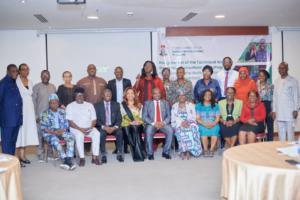Introduction
The National Committee on Food and Nutrition (NCFN), Nigeria’s apex multi-sectoral nutrition coordination platform, convened its first quarterly meeting for 2025 from April 7–8 at De Mandoli Hotel, Karu, Nasarawa State. The meeting, chaired by the Federal Ministry of Budget and Economic Planning (FMBEP) brought together representative of all key & relevant Ministries, Departments and Agencies (MDAs), and other key stakeholders including our development partners, SUN Networks, academia, and Civil Society Organisations.
The objectives of the meeting included:
- Reviewing implementation progress for Q1 (January–March 2025)
- Aligning MDA annual plans with the Nutrition 774 (N774) Initiative
- Evaluating emerging implementation challenges across Sectors
- Strengthening subnational coordination and accountability through tools such as the Performance Management System (PMS)
 The meeting was formally opened by Dr. Emeka Vitalis Obi (mni), Permanent Secretary, FMBEP. He referenced the outcomes of the first bi-annual meeting of the National Council on Nutrition (NCN) held on March 20, 2025, chaired by Vice President Senator Kashim Shettima, which emphasized alignment of MDA annual operational plans with the N774 Initiative. He urged participants to liaise with State and Local Government Committees on Food and Nutrition (SCFN & LGCFN) to extend nutrition interventions to the grassroots.
The meeting was formally opened by Dr. Emeka Vitalis Obi (mni), Permanent Secretary, FMBEP. He referenced the outcomes of the first bi-annual meeting of the National Council on Nutrition (NCN) held on March 20, 2025, chaired by Vice President Senator Kashim Shettima, which emphasized alignment of MDA annual operational plans with the N774 Initiative. He urged participants to liaise with State and Local Government Committees on Food and Nutrition (SCFN & LGCFN) to extend nutrition interventions to the grassroots.
“As we navigate the complex challenges of our times, the importance of your contributions cannot be overemphasized. Your commitment to enhancing food security, promoting healthy eating habits and addressing nutrition needs is essential for the physical and mental health of Nigerians’’— Dr. Emeka V. Obi, Permanent Secretary, FMBEP
In his welcome speech, the Director of Social Development in the Ministry, Dr. Sanjo Faniran, said that all the various Ministries Departments and Agencies (MDAs) represented at the conference were expected to update committee members on key indicators achieved from the implementation of the National Multisectoral Plan of Action for Food and Nutrition (NMPFAN 2021-2025).
Keynote Presentation
Dr. Patricia Ukegbu, Associate Professor, Michael Okpara University of Agriculture, delivered a keynote on “Integrating Gender-Responsive Adolescent Nutrition in the NPFN”. Key recommendations included:
- Including adolescents aged 10–19 in national nutrition priorities
- Gender-disaggregated nutrition data collection
- Leveraging school feeding and biofortification programmes
- Promoting adolescent engagement in policy design
Sectoral Presentations
MDAs including Health, Agriculture, Women Affairs, Youth Development, Education, Information, NAFDAC, SON, and NPHCDA and others shared Q1 progress using a standardized format. Reports covered achievements, constraints, and Q2 priorities.
Identified Cross-Cutting Challenges:
- Delayed release of approved funds
- Weak coordination at the subnational level
- Limited M&E capacity and data systems
Recommendations from Discussions:
- Strengthen financial advocacy for timely budget releases
- Mainstream nutrition into the sectoral operational plans
- Institutionalize Nutrition 774 across all MDAs
- Promote experience-sharing, peer review and model replication
- Strengthen SCFN and LGCFN functionality
New Developments
- Institutionalization of Nutrition Departments:
The establishment of Nutrition Departments in key MDAs (e.g., Health, Agriculture, Women Affairs, Humanitarian Affairs, NPHCDA) is a major milestone. This will enhance planning, accountability, and resource allocation for nutrition at all levels. - Updated Digitized Performance Management System (PMS):
Supported by CS-SUNN, the updated PMS was presented to stakeholders, allowing for real-time performance tracking of state and federal nutrition initiatives. MDAs were urged to submit their quarterly reports using the updated system. - Review of the NPFN and Implementation Strategy:
The FMBEP officially announced the commencement of the review process for the 2016 National Policy on Food and Nutrition and its implementation strategy.
National Nutrition Newsletter Framework:
A detailed session on the National Nutrition Newsletter was presented by CS-SUNN’s Senior Communications Officer, Mrs. Lilian Okafor who emphasized its significance as a key knowledge management, coordination, and visibility tool for the entire Nutrition Body in Nigeria. The newsletter, she said will serve as a central platform for consolidating national and sub-national nutrition updates, spotlighting success stories, and fostering transparency and accountability. She noted that an Editorial Team had been set up to oversee the entire production of the newsletter.
Performance Management System (PMS) Upgrade:
The PMS Developer delivered a live demonstration of the upgraded digitized Performance Management System (PMS), showcasing a user-friendly interface with a Super Admin dashboard that enables real-time tracking of implementation progress across MDAs.
Participants engaged in hands-on sessions, exploring data entry forms and generating analytic reports for internal review and policy advocacy. MDAs were encouraged to update their data regularly to support timely decision-making, improved planning, and greater accountability across Nigeria’s nutrition landscape.
Recommendations:
- Finalization and launch of the revised NPFN and Implementation Strategy
- Publishing of the First Edition of the NCFN Newsletter
- Institutionalization of PMS reporting by all MDAs and SCFNs
- Sustained implementation of Nutrition 774 across Nigeria’s 774 LGAs
- Gender-responsive adolescent nutrition should be prioritized in the revised NPFN.
